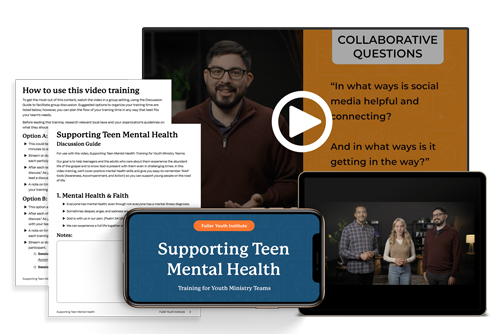3 ways every youth leader can support young people struggling with mental health
 Chuck Hunt
Chuck Hunt
 Aaron Rosales | Aug 20, 2025
Aaron Rosales | Aug 20, 2025
Mental health is one of the biggest challenges facing young people today—and it’s taking a toll on those who care for them, too. Even the U.S. Surgeon General recently issued an advisory acknowledging the rising stress levels among adults who support youth, including parents, teachers, and yes—youth pastors.
If you’ve ever walked away from a conversation with a student wondering, “Did that help at all?,” you’re not alone.
As youth ministry leaders, we work with young people because their faith in Jesus is at the center. The truth is, you won’t always have the perfect words. But your presence matters. Being there for students in their moments of struggle is one of the most sacred parts of ministry. And the good news? You don’t need to be a mental health expert to make a difference. You just need to show up as the caring, consistent adult God has called you to be.
3 ways every youth ministry leader can support young people struggling with mental health
Life can feel a lot like a long road trip. Unexpected things happen—stress builds, we hit bumps, we break down. The same is true for the teens we serve. Sometimes, they find themselves stuck on the side of the road, unsure of what to do next.
As a youth ministry leader, that’s where you come in.
You’re not called to be their therapist or crisis responder. But you are called to be a steady, compassionate presence. Perhaps we can think of ourselves as a kind of spiritual “AAA,” or roadside assistance, showing up when young people need support the most.
Think of your role as offering Awareness, Accompaniment, and Action—three simple but powerful ways to walk with students through life’s hardest moments.
Awareness
As someone who deeply cares about adolescents, you’ve probably already heard a lot of headlines about the mental health struggles young people are experiencing right now. And you probably don’t need the statistics—because you’re seeing them in real life with the young people right in front of you.
Nonetheless, stay informed. Awareness is the first step to supporting young people’s mental health as ministry leaders. Knowledge and reflection allow us to engage young people authentically and inform how we respond when we have concerns. It helps us communicate that our ministry space is a safe and courageous one.
A good start is to learn how to recognize the different signs of three prominent mental health concerns—anxiety, depression, and trauma. Let’s be clear, it isn’t your job to diagnose these things. But learning the key signs and symptoms can help you notice when a young person’s words or behavior suggest they may be struggling and adjust your response to best meet the need. What’s more, it will help you speak up when you suspect a young person could benefit from professional support.

Accompaniment
Accompaniment is being with young people regardless of what they’re going through. God is already with them—our job is to mirror what God is doing in their lives, especially in the midst of anxiety, depression, and trauma. In short, we accompany young people by being present with them in the midst of mental and emotional pain.
How do we actually come alongside young people when they’re struggling with their mental health? Think of these three key building blocks:
- Attunement. Empathy isn’t just something we think about—it’s something we practice. Attunement means tuning in to a student’s emotional cues and responding in a way that shows you see them and feel with them. Attunement puts awareness into action. It’s how we say, without words, “You’re not alone in this.”
- Acceptance. This doesn’t mean agreeing with every choice or endorsing every behavior. Rather, acceptance is being willing to come alongside to accept a precious gift of a young person willing to share their story with us. Acceptance invites us to receive that gift with compassion, not trying to fix, judge, or change them in a tough moment.
- Authenticity. Teens can sense when we’re not being real. That’s why authenticity is so important. It means showing up without a hidden agenda and speaking with honesty, humility, and care. When our care for young people is genuine, we create a space where trust can grow—and where students know they don’t have to pretend, because we’re not pretending either.
By honing our skills in accompaniment, we create a safe space where students feel seen, valued, and supported. We remind them that they’re not alone, and that God’s love (and ours!) meets them right where they are.
Action
Bringing awareness and accompaniment to your ministry practice will likely prompt us to thoughtful action. Though the best next step will depend on your young person and ministry context, here are some caring actions you might take:
- Create a supportive space before initiating a caring conversation. That means intentionally choosing the right time and place. A quick check-in during a busy group setting might not give a student the safety or depth they need. Seek out moments that allow for genuine connection, where your presence can be calm, focused, and unrushed.
- Check in with yourself. Conversations around mental health can stir up strong emotions—not just in students, but in us, too. That’s normal. Before engaging, pause and ask: Am I grounded? Can I set aside my own reactions so I can fully show up for this student? Self-awareness allows us to offer our empathy without judgment and our presence without distraction.
- Listen deeply. It’s easy to jump to solutions or share advice, especially when we want to help. But often, the most powerful thing we can offer is simply listening presence. Being heard is healing. It tells a student: You matter. I see you. You’re not alone.
- Connect with your circle of care. You’re not alone as you carry this responsibility. Healthy ministries should build systems of support: other volunteers, staff, perhaps family members, and mental health professionals like therapists, counselors, and social workers. Knowing when and how to connect students with these resources is part of your care, not a failure of it.
- Get active. When young people feel stuck in anxiety, depression, or trauma, even small steps can feel impossible. But helping them get moving again—emotionally, socially, even physically—can spark hope. Whether it’s encouraging connection, activity, or reaching out for help, movement creates momentum. And momentum creates possibility.
You don’t have to have all the answers. You just have to help them take a healthy step. That’s how we help young people get back on the road.
Learn how to confidently and compassionately support teen well-being

Mental health is a growing concern for teens today, but many adults in ministry feel unsure how to bring up the topic or support young people effectively. Supporting Teen Mental Health: Training for Youth Ministry Teams is packed with professional insight from both mental health and faith perspectives, including stories from real young people and youth leaders.
Build confidence, shared language, and essential skills to support young people right now!
More From Us




Sign up for our email today and choose from one of our popular free downloads sent straight to your inbox. Plus, you’ll be the first to know about our sales, offers, and new releases.



